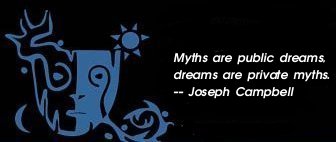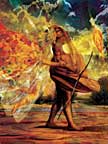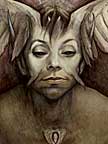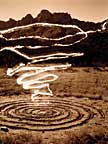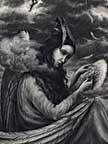|
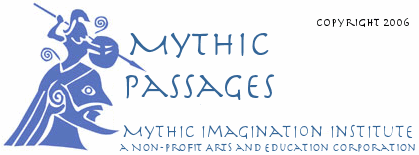
Ancient Dreams:
Myth and History in Fantasy Literature
By O. R. Melling

(Given as a talk in the Belfast Arts Club, Northern Ireland, in August 1992. Subsequently published in
Children's Books in Ireland, the magazine of CLAI, the Children's Literature Association of Ireland,
November 1993.)
Melling was born in Ireland and raised in Toronto, Ontario with her seven sisters and two brothers. At 18
years old, she hitch-hiked across Canada and through California. Shortly after, she travelled to Malaysia and northern Borneo with
Jeunesse Canada Monde/Canada World Youth (see
My Blue Country). While at Trinity College, University of Toronto, she served as an officer in the Naval Reserve, stationed
on the east and west coasts of Canada. She has a B.A. in Philosophy and Celtic Studies, and an M.A. in Mediaeval History. In recent
years she has visited the Yukon and Northwest Territories, as well as Denmark, Scotland, Spain, France and India. At present she
lives in her hometown of Bray, Co. Wicklow with her teenage daughter, Findabhair. To date, various of Melling's books have been
translated into Japanese, Chinese, Russian, Slovenian and Czech. She is guest speaker at Mythic Journeys '06.
At the heart's core of fantasy literature lies the infinite possibility of dreams. Whether it presents alternate worlds in outer
or inner space, alternate forms of life beyond humanity, alternate realities beyond our own, this genre speaks not to the limited
self but to the limitless spirit. The well from which it draws its inspiration — be it established myth or the capacity for myth-making
— is that which Joseph Campbell calls 'the lost forgotten living waters of the inexhaustible source.'
Fantasy literature of the high tradition is a song of hope. It whispers a simple message: as long as the spirit is intact, nothing
is broken irreparably. It is idealistic in both the conventional and the Platonic sense, and can therefore be a nourishing source for
the idealism of youth. Young people are by nature idealistic as, regardless of the hardships they may have already endured, they
do not have the accumulation of failures which every adult has gathered through time and experience.
We as adults can react to youth's spirit in either a negative or positive way. We can envy or resent their innate optimism and
we can discourage it with cynicism, or even actively try to break it. Or we can nurture and encourage that fiery seed in the hopes
that this generation might actually win. This generation may not inevitably lose their dreams to disillusionment or defeat.
Gottfried von Strassburg,
the 13th century author of Tristan, wrote of his work: 'I have undertaken a labour, a labour out of love for the world,
to comfort noble hearts.'
Fantasy literature is often considered to be simply a form of escapist fiction. Firstly, I do not feel that 'escaping' is necessarily
valueless in itself. As anyone who needs a holiday will attest, escaping can be a form of psychological and psychic regeneration as
necessary as sleep. But I would also maintain that anything which encourages dreams and aspirations of a better self or a better
world, anything which 'comforts noble hearts', is hardly an escape from reality. Rather, it can be an aid to survival and a source of
strength, as well as a possible vehicle for improvement. And, as Tolkien pointed out, 'a living mythology can deepen rather than
cloud our vision of reality.'
A critic who reviewed
The Druid's Tune when it was first published in Canada made this comment: 'The themes have
less to do with the actuality of that ancient world and more to do with dreams, images of courage, love, nobility and self-sacrifice
that indicate the strength of fantasy to depict our deepest longing and dreams of right behaviour.'
From early childhood I was an avid reader of fantasy writers: C.S. Lewis, J.R.R. Tolkien, P.L. Travers, E. Nesbit , Susan Cooper,
Patricia Lynch, John Masefield, and Alan Garner among many others. Today I would say without a doubt that it is their books and
not any other source of social inculcation — be it religious, parental, educational or whatever — that instilled in me an
inner sense of realization and judgment about right and wrong, good and evil.
While I'm speaking so grandly here, I should point out that my book is quite simple and quite simply written. On one level it is a
time-travel adventure in which two modern-day teenagers are brought back into Ireland's mythical past to meet the warrior queen
Maeve and the boy hero Cuchulainn. But on another level there is an undercurrent or subtext which deals with the questions of the
necessity of war and the existence of the soul and the infinite spirit of life.
It's not that I have consciously sugar-coated 'important messages' with an action-packed adventure. I do not think the book
would work if I had done that, as young people, especially teenagers, can smell a rat a mile away. But in fact this is the nature and
integrity of ancient myth itself. Again I quote Tolkien: 'The mythological imagination can deal in a profoundly revelatory way with
serious moral and spiritual issues.'
One of the most fascinating aspects of the epic myth on which my book is based — the
Táin Bó Culaigne
or Cattle-Raid of Cooley — is that the original tale itself contains the message that all the battles and bloodshed are
ultimately tragic and futile. Two sections of the myth underline this idea: the massacre of the youth troop of Ulster and Cuchulainn's
killing of his foster-brother Ferdia. I feel that a scene which begins with the 'glorious gallantry' of battle and ends with the slaughter of
a group of youngsters does more to raise questions about the nature of war than any outright moralizing or argumentation. The same
can be said of a scene in which the very like-able Cuchulainn weeps over the body of his best friend whom he has had to kill.
Is this, you may ask, a fit subject for young people? (A critic in Canada who objected to my work maintained I was 'as bad as
C.S. Lewis' for having my young characters go to war.) I believe the greatest disservice we can do to young people is to pretend
that something is not there when it is. We live in a war-torn world. By refusing to admit the reality of war, by denying its constant
presence in the history of our race, by refusing to talk about it and the reasons for its existence, we guarantee that it will continue.
And we are not protecting our children by guarding them from it; rather, our silence may well guarantee that they will experience it.
Bruce Chatwin, the travel writer, had a wonderful anecdote on this notion of 'shielding' children from the truth. When he was
a little boy he went for a walk in the country with his father, and he spotted the carcass of an animal on the side of the road.
'What's that?' he asked his father.
'An old coat, I think,' was the reply, to protect the child's sensibilities.
'Looks like a squashed hedgehog to me,' said the boy.
The myth on which The Druid's Tune is based is a tale of war. So my young characters, with all the naivety and innocence and
idealism of youth, enter into and confront one of the most common realities and greatest tragedies of our race. How they deal with
this confrontation, keeping their spirits intact is the stuff of which my own myth is made.
In conclusion, I would say of modern mythical fantasies that they reflect the same universality as their traditional forbears. For they,
too, echo with 'ancient dreams' the unconscious knowledge of what it has always been to be human, all the wonder and horror of our
existence, and all the yearning and hope for some thing better.
Read more about O.R. Melling at her website
Return to Passages Menu
Subscribe to the Passages e-newsletter
|
